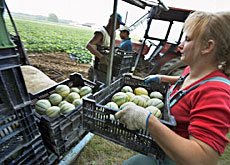
Asylum abuse proved decisive for voters

Public anger at abuse of the asylum system was the determining factor behind overwhelming voter approval of tougher legislation, according to political scientist Marc Helbling.
On Sunday around 68 per cent of voters backed new laws on immigration and asylum, which the government says are necessary to make Switzerland less attractive and to curb abuses.
Helbling, who works at Zurich University’s institute of political sciences, told swissinfo that he was surprised by the size of the majority but said the results mirrored referendums on asylum in 1987 and 1999.
Support for tougher entry restrictions surged in the run-up to Sunday’s vote, after final polls ten days ago had revealed approval ratings of around 60 per cent.
“The key issue was the revelation of abuses by asylum seekers. I would say that everybody in Switzerland is against abuse of any law, including those who are normally in favour of more immigration.”
This was a view endorsed by the Swiss branch of Amnesty International, which formed part of the coalition of centre-left parties, trade unions, churches and aid organisations, which forced Sunday’s votes.
“I don’t think the Swiss are xenophobic but they don’t agree with abuse. This ended up being a major feature of the campaign and made the difference. But it’s not really as big an issue as has been made out,” Amnesty’s refugee coordinator Denise Graf told swissinfo.
Valid ID
Under the new asylum law, those who fail to produce valid travel and identification documents within 48 hours will be rejected. Asylum seekers who refuse to leave the country can be jailed for up to two years pending deportation.
They will also lose the right to social security benefits and can only receive emergency aid of SFr960 ($780) a month.
The amended law on foreigners limits immigration for those from outside the European Union and the European Free Trade Association (Efta) to highly skilled workers.
Opponents had argued that the proposals went against the humanitarian tradition of Switzerland – a non-EU member – and would leave the country with some of the most restrictive asylum and immigration rules in Europe.
But Helbling said Sunday’s results did not mean that the Swiss could now be branded “xenophobic”.
“Certainly there will be reactions that the Swiss are too strict and xenophobic,” he said. “But Switzerland is not that different from the EU [European Union], which is also trying to keep out foreigners from non-EU countries.”

More
Canton
“Severe” legislation
The United Nations refugee agency (UNHCR), which has repeatedly condemned the new laws as too severe, was quick to express its disappointment on Sunday.
Switzerland was among the original signatories of the 1951 refugee convention and hosts the international headquarters of the UNHCR.
Spokesman William Spindler said the agency would follow closely the actions of the Swiss government to ensure that treatment of asylum-seekers and refugees stayed in line with international rules.
“The UNHCR takes note and regrets that this new restrictive legislation is being adopted,” he said.
Former cabinet minister Ruth Dreifuss, who led the campaign by opponents, said she was “disappointed but not discouraged”. She too called for the new laws to be applied humanely.
swissinfo, Adam Beaumont
It is the ninth time since 1984 that Switzerland’s asylum law has been amended. Five of the proposals to tighten the regulations were approved in nationwide votes.
Under a bilateral treaty agreed with Brussels, EU citizens are not subject to immigration restrictions. But there is a sizeable community of people from Balkan countries and Turkey living in Switzerland.
There were 10,061 asylum applications in Switzerland last year, a 30 per cent drop compared with figures from 2004, according to the UN refugee agency.
Almost 68% of voters approved a tightening of the asylum law and limiting immigration for citizens from outside the European Union.
All 26 cantons also voted in favour of the new laws, which were passed by parliament last year.
Voter turnout was slightly higher than average at 48%.

In compliance with the JTI standards
More: SWI swissinfo.ch certified by the Journalism Trust Initiative




























You can find an overview of ongoing debates with our journalists here . Please join us!
If you want to start a conversation about a topic raised in this article or want to report factual errors, email us at english@swissinfo.ch.